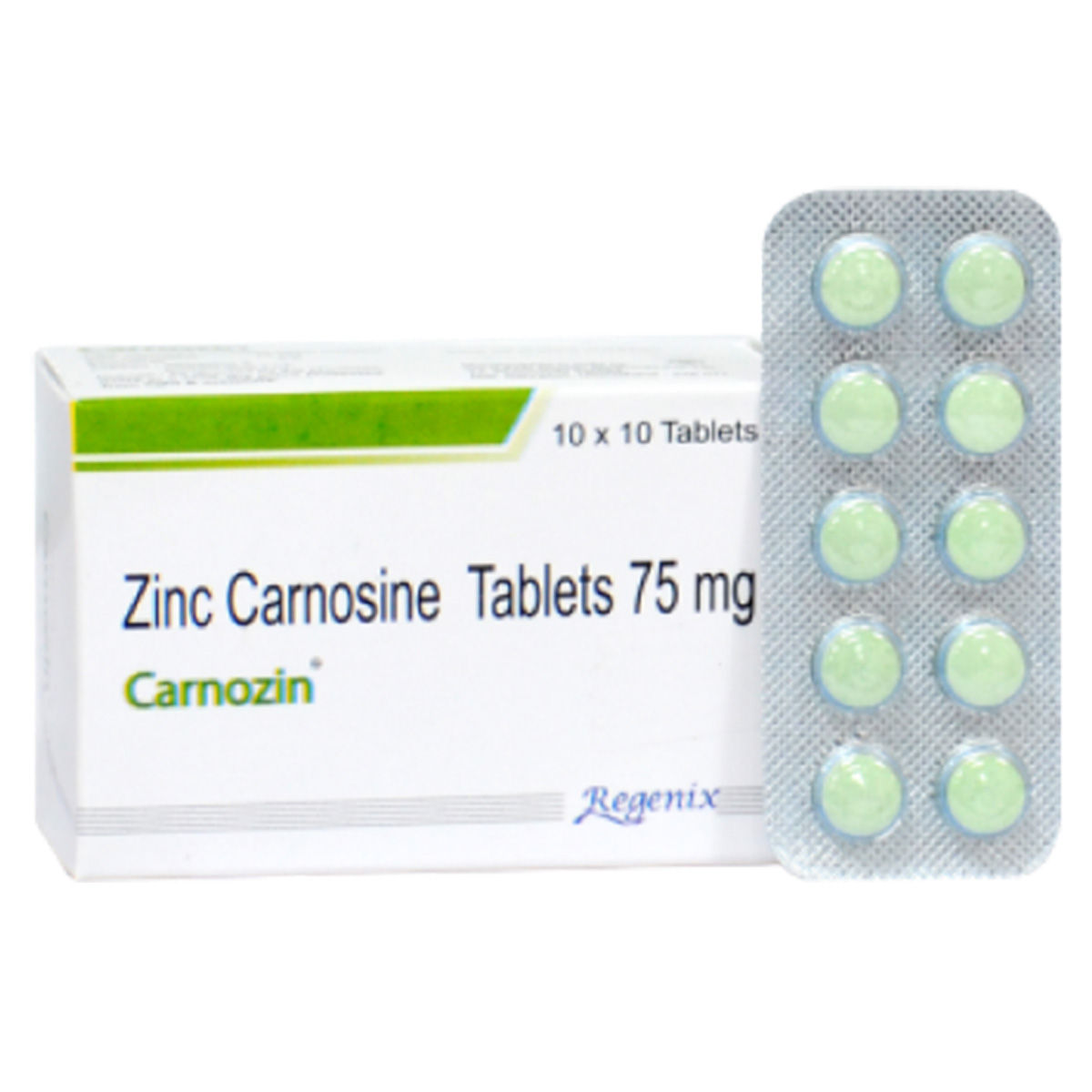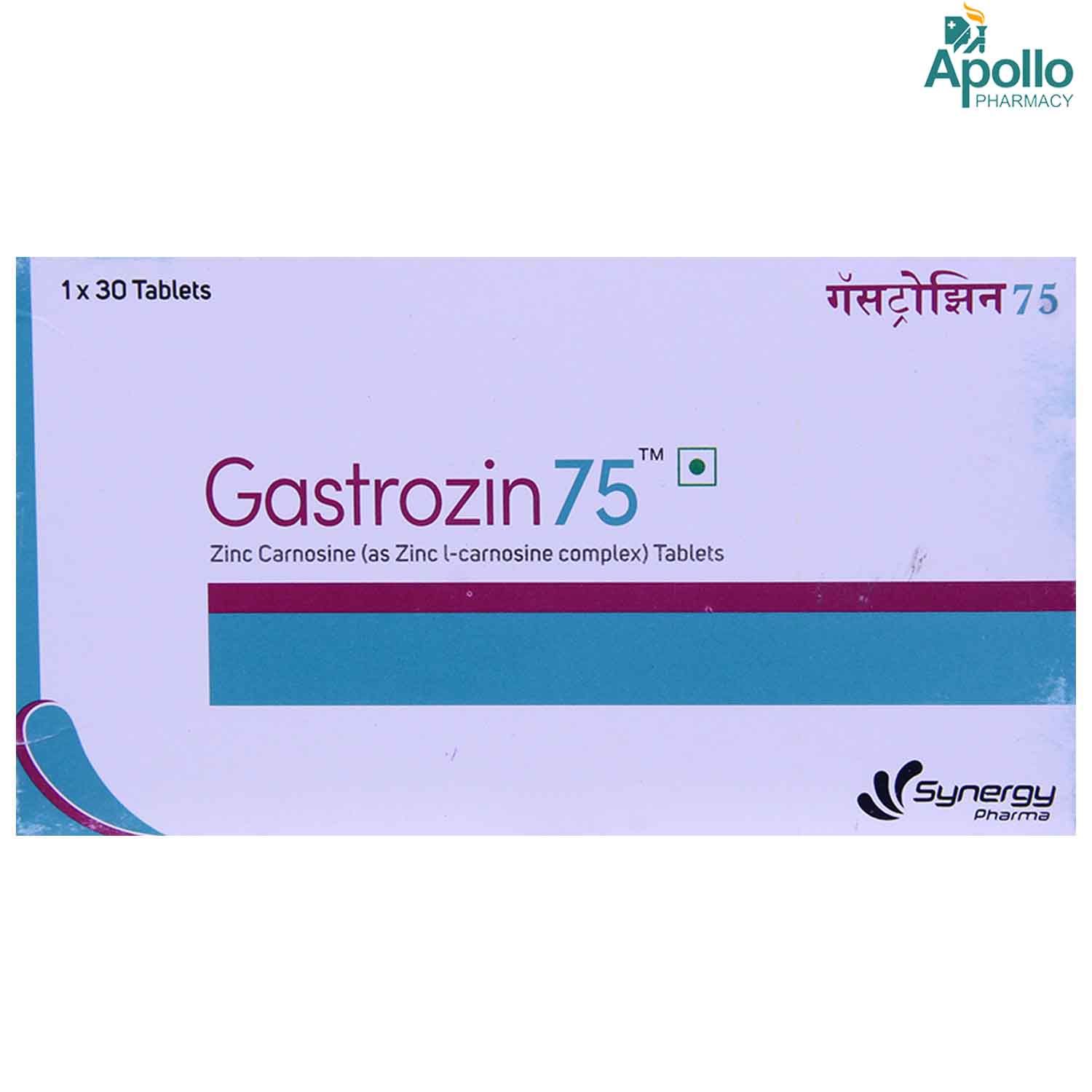Zinc Carnosine
About Zinc Carnosine
Zinc Carnosine is a nutritional supplement used to stabilise and protect the gastric and intestinal mucosal lining, helps relieve mild gastric discomforts such as nausea, bloating, stomach upset, and occasional heartburn, and supports a healthy gastric microbial balance. It possesses gastrointestinal and health-promoting activity. Zinc Carnosine may also be used to treat nutritional deficiencies.
Zinc Carnosine contains 'Zinc carnosine', which is a complex of elemental zinc and L-carnosine. L-carnosine is a dipeptide molecule made up of two amino acids, namely, beta-alanine and L-histidine. Zinc Carnosine enhances stomach lining integrity and supports natural protective mechanisms in the gastrointestinal tract without interfering with the normal digestive process or suppressing stomach acid. It helps maintain the stomach microflora, thereby enhancing digestive health.
You are advised to take Zinc Carnosine for as long as your doctor has prescribed it for you, depending on your medical condition. In some cases, you may experience common side effects such as nausea, indigestion, and stomach pain. Most of these side effects do not require medical attention and will resolve gradually over time. However, you are advised to talk to your doctor if the side effects persist or worsen.
Let your doctor know if you are taking prescription, non-prescription drugs, or herbal products before starting Zinc Carnosine. If you are known to be allergic to any of the components in Zinc Carnosine, please inform your doctor. Consult your doctor if you are pregnant or breastfeeding. Zinc Carnosine should be given to children only if prescribed by a doctor. It is unknown if alcohol interacts with Zinc Carnosine, so please consult a doctor if you have any concerns.
Uses of Zinc Carnosine
• Treatment of gastric ulcers: Zinc Carnosine promotes healing of the stomach lining and helps reduce ulcer formation.
• Management of dysbiosis: Zinc Carnosine promotes gut microbial balance, which aids in the treatment of intestinal dysbiosis.
• Management of gastritis: It reduces stomach lining inflammation and supports mucosal repair.
• Protection of gastrointestinal mucosa: Zinc Carnosine acts as a protective barrier to prevent damage from stomach acid and irritants.
• Support in Helicobacter pylori treatment: It may be used alongside standard therapy to treat ulcer-related infections.
• Relief of acid-related discomfort: Zinc Carnosine helps reduce symptoms like heartburn and indigestion.
• Enhancement of intestinal healing: It helps the intestinal lining recover after mucosal injury or inflammation.
Medicinal Benefits
Zinc Carnosine contains 'Zinc carnosine', a complex of elemental zinc and L-carnosine. L-carnosine is a dipeptide molecule made up of two amino acids, namely, beta-alanine and L-histidine. Zinc Carnosine is a nutritional supplement used to stabilise and protect the gastric and intestinal mucosal lining, helps relieve mild gastric discomforts such as nausea, bloating, stomach upset, and occasional heartburn, and supports a healthy gastric microbial balance. Zinc Carnosine supports natural protective mechanisms in the gastrointestinal tract without interfering with the normal digestive process or suppressing stomach acid. It helps maintain the stomach microflora, thereby enhancing digestive health. Zinc Carnosine possesses gastrointestinal and health-promoting activity. It may also be used to treat nutritional deficiencies. Zinc, when complexed with L-carnosine, dissociates at a slower rate in the stomach; this prolonged existence allows Zinc Carnosine to maintain its gastric healing capacity for an extended period.
Directions for Use
- Zinc Carnosine can be taken with or without food, or as advised by your doctor.
- Follow your doctor's instructions on the dosage and timing of this medication to ensure safe and effective use.
- Swallow Zinc Carnosine as a whole with a glass of water.
- Do not crush, break or chew it.
Storage
Side Effects of Zinc Carnosine
- Nausea
- Indigestion
- Stomach pain
Drug Warnings
Do not take Zinc Carnosine if you are allergic to any of its contents. Consult a doctor if you are pregnant or breastfeeding. Zinc Carnosine should be given to children only if prescribed by the doctor. It is unknown if alcohol interacts with Zinc Carnosine, so please consult a doctor. Keep your doctor informed about your health condition and the medicines you are taking to rule out any side effects/interactions.
Drug Interactions
Drug-Drug Interactions: No interactions found/established.
Drug-Food Interactions: No interactions found/established.
Drug-Disease Interactions: No interactions found/established.
Drug-Drug Interactions Checker List:
Safety Advice

Alcohol
consult your doctorIt is unknown if alcohol interacts with Zinc Carnosine, so please consult a doctor.

Pregnancy
cautionPlease consult a doctor if you are pregnant. Your doctor will prescribe only if the benefits outweigh the risks.

Breast Feeding
cautionPlease consult a doctor if you are breastfeeding. Your doctor will decide if Zinc Carnosine can be taken by breastfeeding mothers or not.

Driving
consult your doctorIt is unknown whether Zinc Carnosine affects your ability to drive. Drive or operate machinery only if you are alert.

Liver
consult your doctorLimited data are available regarding the usage of Zinc Carnosine in patients with liver impairment. Please consult your doctor if you have a liver impairment or any concerns regarding this.

Kidney
consult your doctorLimited data is available regarding the usage of Zinc Carnosine in patients with kidney impairment. Please consult your doctor if you have kidney impairment or any concerns regarding this.

Children
consult your doctorLimited information is available regarding the usage of Zinc Carnosine in children, so consult a doctor if you have any concerns.
Habit Forming
Diet & Lifestyle Advise
- Maintain proper weight by following a healthy diet.
- Avoid smoking and alcohol consumption.
- Avoid stress by practising meditation or yoga.
- Include fruits and vegetables in your diet as they contain antioxidants.
- Limit foods with high cholesterol and saturated fats.
- Cut down on sugar, salt and processed foods.
- Follow a healthy lifestyle, as it helps improve overall health.
Patients Concern
Disease/Condition Glossary
Gastric discomfort: The stomach is usually protected from acid by a mucous layer. In some cases, due to excessive acid production, the mucous layer becomes eroded, leading to complications such as acidity, heartburn, and indigestion. Bloating occurs when the abdomen is filled with gas or air.
Dysbiosis: Dysbiosis, also known as dysbacteriosis, is a condition characterised by a disruption of microbiota homeostasis caused by an imbalance in the microflora, a shift in their local distribution, changes in their functional composition, and alterations in their metabolic activities.
FAQs
Zinc Carnosine is used to stabilise and protect the gastric and intestinal mucosal lining. It helps relieve mild gastric discomforts such as nausea, bloating, stomach upset, and occasional heartburn. Zinc Carnosine also supports a healthy balance of gastric microorganisms.
Zinc Carnosine promotes a healthy stomach lining and environment. It enhances the integrity of the stomach lining and supports the natural protective mechanisms in the gastrointestinal tract.
To treat your condition effectually, continue taking Zinc Carnosine for as long as your doctor has prescribed it for you. Do not hesitate to consult your doctor if you experience any difficulties while taking Zinc Carnosine.
Zinc Carnosine helps relieve mild gastric discomforts such as nausea, bloating, stomach upset, and occasional heartburn. It helps maintain the stomach microflora, thereby enhancing digestive health.
If you miss a dose, try to take it as soon as you remember. However, if it is time for the scheduled dose, skip the missed dose and take the scheduled dose instead. Avoid taking the double dose as it may lead to an overdose or unpleasant side effects.
Avoid taking more than one nutritional supplement at the same time unless advised by the doctor. Taking similar nutritional supplement products together can lead to a vitamin overdose or serious side effects.









